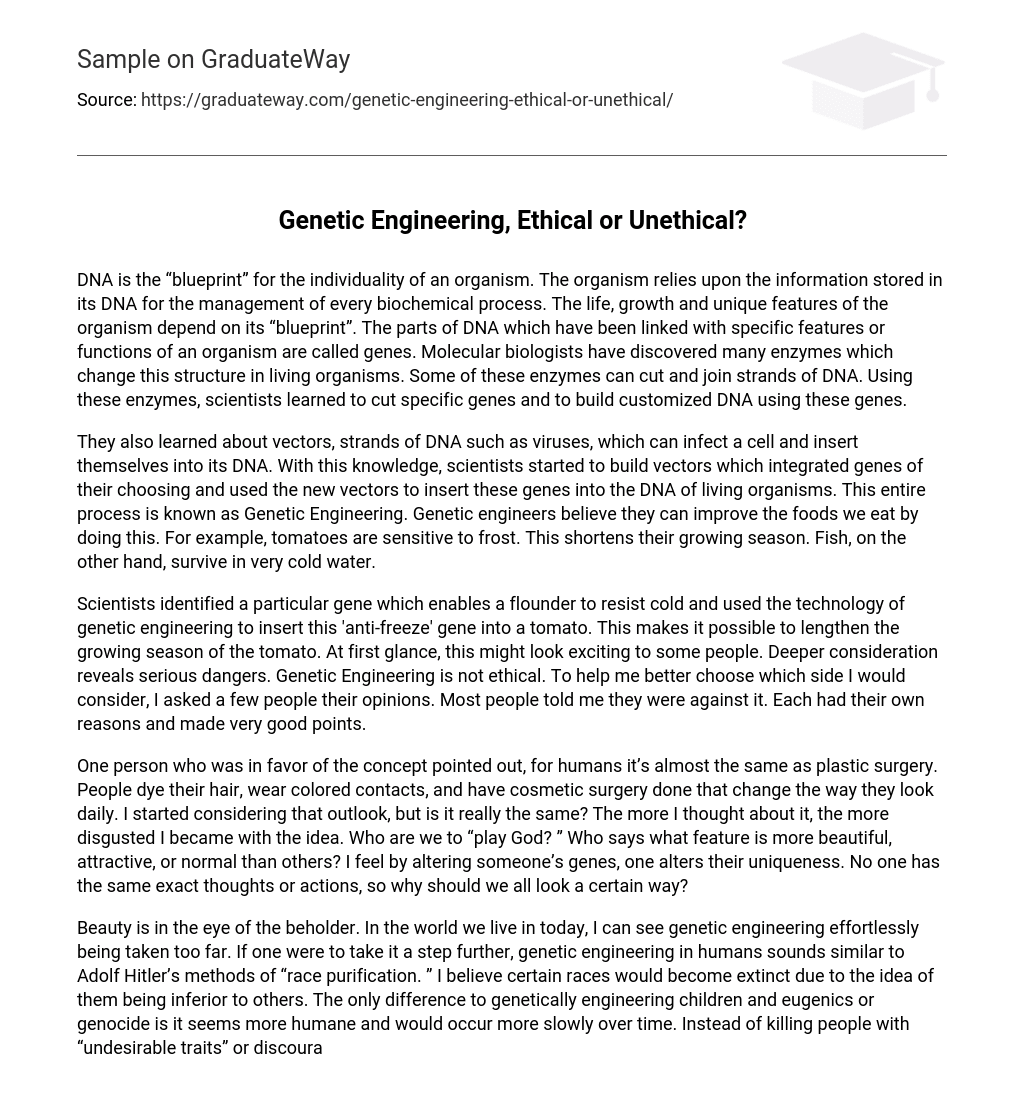DNA is the “blueprint” for the individuality of an organism. The organism relies upon the information stored in its DNA for the management of every biochemical process. The life, growth and unique features of the organism depend on its “blueprint”. The parts of DNA which have been linked with specific features or functions of an organism are called genes. Molecular biologists have discovered many enzymes which change this structure in living organisms. Some of these enzymes can cut and join strands of DNA. Using these enzymes, scientists learned to cut specific genes and to build customized DNA using these genes.
They also learned about vectors, strands of DNA such as viruses, which can infect a cell and insert themselves into its DNA. With this knowledge, scientists started to build vectors which integrated genes of their choosing and used the new vectors to insert these genes into the DNA of living organisms. This entire process is known as Genetic Engineering. Genetic engineers believe they can improve the foods we eat by doing this. For example, tomatoes are sensitive to frost. This shortens their growing season. Fish, on the other hand, survive in very cold water.
Scientists identified a particular gene which enables a flounder to resist cold and used the technology of genetic engineering to insert this ‘anti-freeze’ gene into a tomato. This makes it possible to lengthen the growing season of the tomato. At first glance, this might look exciting to some people. Deeper consideration reveals serious dangers. Genetic Engineering is not ethical. To help me better choose which side I would consider, I asked a few people their opinions. Most people told me they were against it. Each had their own reasons and made very good points.
One person who was in favor of the concept pointed out, for humans it’s almost the same as plastic surgery. People dye their hair, wear colored contacts, and have cosmetic surgery done that change the way they look daily. I started considering that outlook, but is it really the same? The more I thought about it, the more disgusted I became with the idea. Who are we to “play God? ” Who says what feature is more beautiful, attractive, or normal than others? I feel by altering someone’s genes, one alters their uniqueness. No one has the same exact thoughts or actions, so why should we all look a certain way?
Beauty is in the eye of the beholder. In the world we live in today, I can see genetic engineering effortlessly being taken too far. If one were to take it a step further, genetic engineering in humans sounds similar to Adolf Hitler’s methods of “race purification. ” I believe certain races would become extinct due to the idea of them being inferior to others. The only difference to genetically engineering children and eugenics or genocide is it seems more humane and would occur more slowly over time. Instead of killing people with “undesirable traits” or discouraging them to reproduce we are simply destroying the gene itself.
Since the holocaust gave eugenics a “bad name,” the term genetic engineering puts a friendly twist on it. People feel they are given a choice to “better” their children and the human race. Predisposing certain traits is racist and goes against human rights. Without most people realizing, one can infer that genetic engineering could create another “Great War” in the long run. Besides the unethical and unnatural reproduction of humans, Genetic Engineering has many other condemnations. From genetic engineering, all crops, organic and non-organic, are vulnerable to contamination from cross-pollination.
Genetic engineers also intend to profit by patenting genetically engineered seeds. This means that, when a farmer plants genetically engineered seeds, all the seeds have identical genetic structure. As a result, if a fungus, a virus, or a pest develops which can attack this particular crop, there could be widespread crop failure. It can also be dangerous towards animals and future animals. A gene can be cut precisely from the DNA of an organism, but the insertion into the DNA of the new organism is mostly random. As a consequence, there is a risk that it may disrupt the functioning of other genes essential to the life of that organism.
The influence of a genetically engineered organism on the food chain may damage the local ecology. The new organism may compete successfully with wild relatives, causing unforeseen changes in the environment. Once genetically engineered organisms, bacteria and viruses are released into the environment it is impossible to contain or recall them. Unlike chemical or nuclear contamination, negative effects are irreversible. In conclusion, Genetic Engineering is unnatural for human development, hazardous towards our food, and harmful to the environment and its living creatures. In all, Genetic Engineering is unethical.





